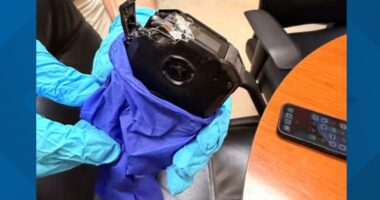Share this @internewscast.com
WASHINGTON — Many doctors and scientists were taken aback Monday after President Donald Trump appeared on television, urging that pregnant women should never use Tylenol, while simultaneously bringing up discredited theories linking vaccines to autism.
Trump’s remarks extended beyond the recommendations of his own Food and Drug Administration, which had only advised that doctors “should consider minimizing” the use of the painkiller acetaminophen during pregnancy due to inconclusive evidence on whether excessive use could be associated with autism. These statements coincided with the administration’s efforts to increase availability for a potential but unverified autism treatment and to announce more research into the disorder.
Dr. Steven Fleischman, the president of the American College of Obstetricians and Gynecologists, expressed concern that the claims about Tylenol could alarm expectant mothers and parents of children with autism.
“I don’t want you reflecting back and questioning, ‘I shouldn’t have done this, I shouldn’t have done that.’ It’s not something you’ve caused. It truly is not,” he stated. “The risk of not treating a fever probably poses greater concerns than taking the medication itself.”
Regarding vaccines, American Academy of Pediatrics president Dr. Susan Kressly noted, “numerous studies have consistently shown no credible connection between essential childhood vaccines and autism. Any attempts to misrepresent this robust, conclusive science pose a risk to children’s health.”
Earlier this year, Health Secretary Robert F. Kennedy Jr. vowed to identify the cause of autism by September. This declaration puzzled brain specialists, who argue that there isn’t a single cause and that his words disregard decades of research into the genetic and environmental factors that may contribute.
Here’s what we know about autism and the Trump administration’s new steps to address it.
What is autism?
Autism isn’t a disease. It’s a complex developmental condition better known as autism spectrum disorder that affects different people in different ways.
It can include delays in language, learning or social and emotional skills. For some people, profound autism means being nonverbal and having intellectual disabilities, but the vast majority of people experience far milder effects.
Autism rates have been going up for decades
There are two main reasons. First, the definition of autism broadened as scientists expanded their understanding of its wide range of traits and symptoms. That led to changes in the criteria doctors use to diagnose autism and improvements in screening.
At the same time, parents increasingly sought a diagnosis as autism became better known and schools began offering educational services they hoped could help their kids.
As late as the 1990s, only children with the most profound symptoms were considered to have autism. In the early 2000s, as the definition began changing, the autism rate was estimated to be 1 in 150 children. The latest count found 1 in about 31 children are affected by autism spectrum disorder.
The increase isn’t among the profound cases; it’s an increase in the milder cases that weren’t historically considered autism, said expert Helen Tager-Flusberg of Boston University.
There is no single test for autism, which is diagnosed mostly through developmental and behavioral assessments.
It’s hard to tell if there may be additional factors behind the increase.
What’s the state of autism research?
Science has shown autism is mostly rooted in genetics, with the discovery of several hundred genes that play a role. Those genes can be inherited, even if the parent shows no signs of autism, or mutations can occur as the brain is developing and its rapidly dividing cells make mistakes.
Experts say different combinations of genes and other factors can all affect how a fetal brain develops. They include such factors as the age of a child’s father, preterm birth and whether the mother had health problems during pregnancy such as fevers, infections or diabetes.
What about Tylenol?
Some studies have raised the possibility that taking the over-the-counter painkiller in pregnancy might be associated with a risk of autism – but many others haven’t found a connection. In addition, the Coalition of Autism Scientists said Monday that acetaminophen use during pregnancy hadn’t increased in recent decades like autism rates have. Acetaminophen is known in most countries outside the U.S. as paracetamol.
But untreated fevers in pregnancy, particularly the first trimester, increase the risk for miscarriages, preterm birth and other problems, according to the Society for Maternal-Fetal Medicine.
Part of the difficulty in settling the question is that studies using medical records can’t tell if the fever, or a drug to lower the fever, might be connected to later health.
The FDA wrote doctors on Monday advising them to minimize acetaminophen’s use during pregnancy but acknowledged uncertainty: “To be clear, while an association between acetaminophen and autism has been described in many studies, a causal relationship has not been established and there are contrary studies in the scientific literature.”
Tylenol’s label already advises women to ask their doctor about use in pregnancy, and the society continues to advise that it’s an appropriate option.
What is the possible new autism treatment?
Also Monday, the FDA announced it was taking initial steps to try to approve a folic acid metabolite called leucovorin as a treatment option for some people with autism. It’s based on a theory that some people have too little folate, a form of vitamin B, in the brain and that giving them more could alleviate some symptoms.
Women already are told to take folic acid before conception and during pregnancy because it reduces the chances of certain birth defects, advice that possibly could help lower autism risk as well, Tager-Flusberg said.
Leucovorin is sold for other health conditions and already used by some families in hopes of helping autism. But Tager-Flusberg cautioned that only a few small, first-step studies have been done so far.
“Is this something worth pursuing? Yes, it is in potentially a subset of individuals,” she said. But there needs to be a large, very rigorous study to prove if it really works.
What about vaccines?
Any concern that vaccines could be linked to autism has been long debunked, stress scientists and leading advocacy groups for people with autism.
Childhood vaccines – and how and when to give them in combination – go through rigorous studies, and safety tracking continues for years as the shots are used.
“No doubt children will suffer” from Monday’s claims, said Dr. Paul Offit, a pediatrician and vaccine expert at the Children’s Hospital of Philadelphia.
Copyright © 2025 by The Associated Press. All Rights Reserved.
















